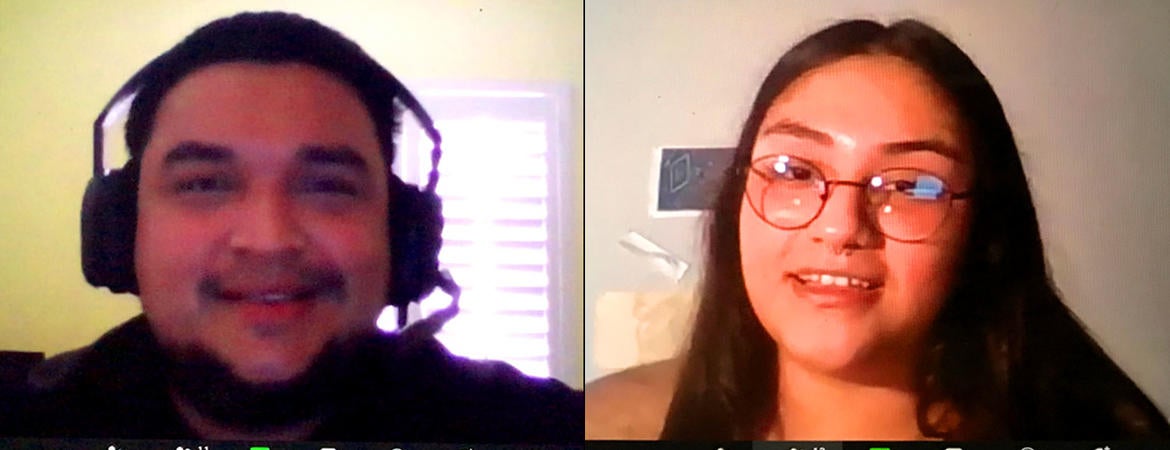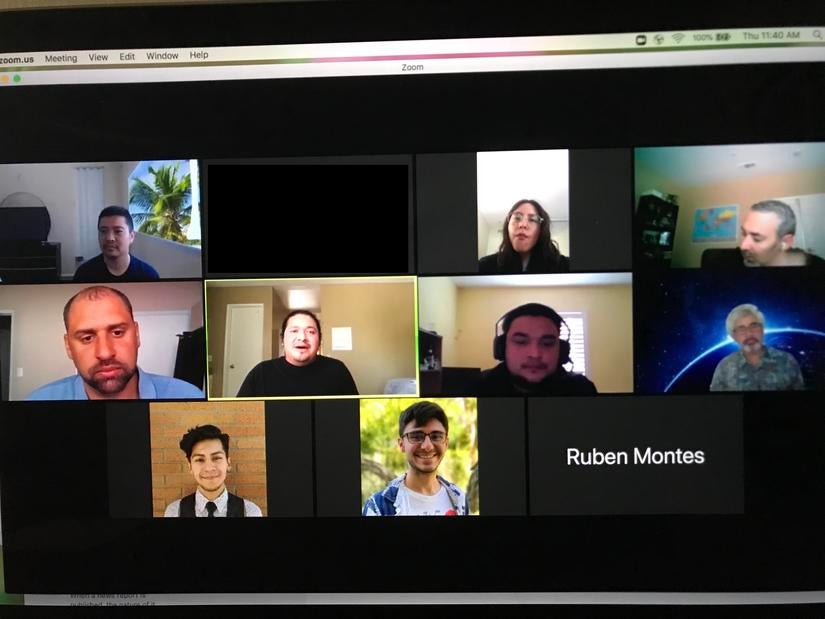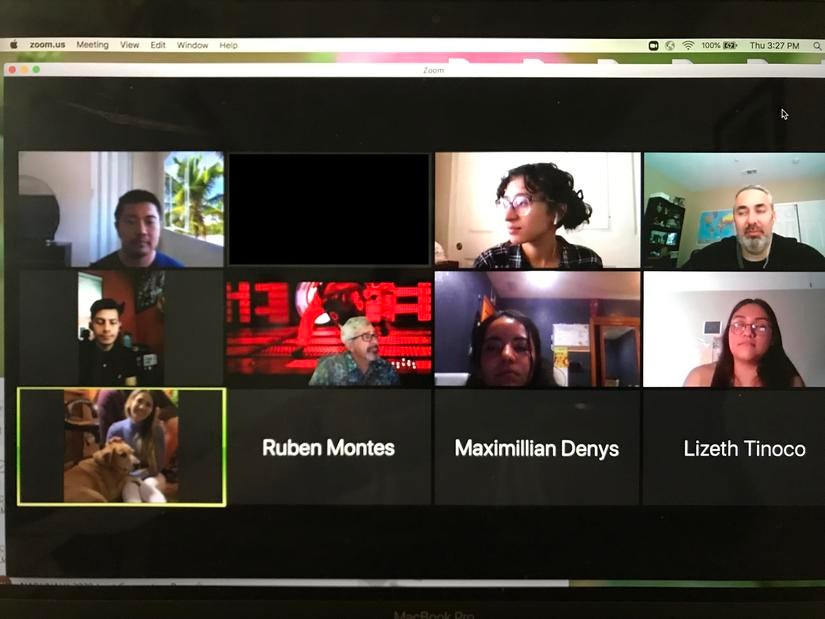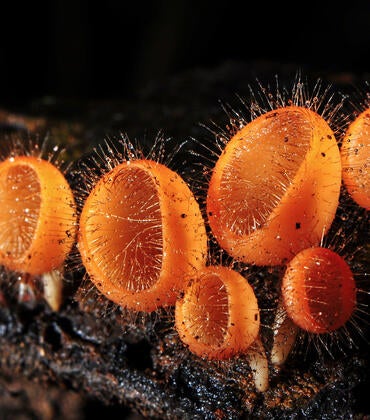
Spring quarter has brought some challenges to the forefront, but one thing has not waivered: the commitment of 14 UC Riverside professors to mentor undergraduate students.
This quarter, the faculty-student teams from the Louis Stokes Alliance for Minority Participation, also known as CAMP in California, have been creating new research projects or finding creative ways to continue the work they started before the pandemic forced the school closure.
For this academic year, UCR CAMP, part of a UC-wide program designed to support underrepresented students pursuing research and careers in science, technology, engineering, and mathematics, also known as STEM, awarded research grants to 20 scholars, including the 14 students working with faculty.
The UC-wide CAMP is headquartered at UCR; last year the National Science Foundation awarded CAMP a five-year, $4 million grant. UCR CAMP currently has 62 registered members and 20 faculty mentors.
On Thursday, May 28, CAMP scholars spoke about their research projects during a 10-minute “Lightning Talk.” This presentation tested the students’ ability to clearly explain their technical research, procedures, methods, and lessons learned to a lay audience.
Despite the pandemic and the remote-working requirements, students still need the research experience, especially seniors who are moving into industry jobs or graduate school, said Brandon Brown, UCR CAMP faculty director and an associate professor at UCR’s School of Medicine.
STEM students who join CAMP sometimes come in thinking their only career option is to become a medical doctor or engineer, Brown said. But CAMP broadens that view and allows them to explore fields such as research and academia. For a diverse school like UCR, having CAMP students become future professors would be ideal, he added.
“One of the goals is to change the face of academic leadership, to have campus faculty be more reflective of the diversity we see among our students,” said Brown, a former CAMP student himself. “It takes some time to get to that point, but we are starting.”
The 14 faculty-student teams selected for spring quarter include Assistant Professor of Chemistry Joseph Genereux and third-year neuroscience student Shellsee Gutierrez, as well as Associate Professor of Neuroscience Margarita Currás-Collazo and third-year cell molecular and developmental biology major Maximillian “Max” Denys.
Both Genereux and Currás-Collazo said they decided to virtually mentor these students because they want to give back and support first generation students who might need a bit of guidance to discover what career paths a STEM degree can offer.
When Gutierrez, 21, started working with Genereux’s lab two years ago, she worked on a different project and soon discovered that the initial observation was not adequately reproducible. But she did not get discouraged.
This year as a CAMP scholar, even in the midst of the pandemic, she quickly dove into a new assignment that required coding and using completely new software. Gutierrez learned it on her own and is helping advance the project, a collaboration between Genereux’s lab and the Massachusetts Institute of Technology.
Her job is to analyze data and use computer software to study whether stress levels affect the process of protein formation in the body.
“I had never taken any computer science classes before, but you just have to be very willing to adapt in order to move forward,” Gutierrez said. She is thankful for the opportunity to learn and to show her family what a STEM career can look like.
“When you come from a Latino background, no one knows what research is about,” said Gutierrez, who plans to become a researcher. “I told my mom that what I do is basically having a question, and then having to find the answers yourself. But that’s not entirely new for me, that was something I always did as a kid. I would open the remote controls just to know what was inside.”
Gutierrez's perseverance in the face of challenges and optimism about finding answers for this new hypothesis means she is willing to work hard, Genereux said.
“I could see that she was someone I could trust,” Genereux said. “She understands the technical details that are required. This means I can trust the data that she is generating.”
For Currás-Collazo and Denys, the experience has been just as gratifying. They met last summer when Denys participated in another STEM research program. Continuing to work with Denys “is always a pleasure since he is always eager to learn and discover more,” Currás-Collazo said.
Denys’ research project, expected to last at least one year, attempts to determine if a chemical compound used as a flame retardant found in common consumer products such as cars, beds, computers, and stuffed animals, can be a risk factor for autism. According to Denys, PBDEs contaminate the indoor and outdoor environment, and therefore ingested and inhaled by humans over their lives. This is especially important for new mothers because these toxins can be transferred to the baby while in utero and during breastfeeding.
Denys said he is lucky to have Currás-Collazo and graduate student Elena Kozlova as his mentors. During this pandemic, Currás-Collazo has been taking safety measures to visit the lab and run tests that she sends to Denys to analyze and input into the computer system he manages from home.
“It’s been a very rewarding career for me,” said Denys, 27, who transferred from a local community college. “I came in as a premed student, but now being involved in research, and especially with COVID-19, I’m going to focus on research and pursue an MD Ph.D.”
As a first-gen student herself, Currás-Collazo said she feels the need to pass on research skills and share career opportunities with her students.
“I teach; I share knowledge; but I also generate new knowledge, and in doing so I like to bring students along with me in that very privileged endeavor,” she said. “It’s been a pleasure having Max; he’s brought in new ideas too. It’s not just me coming up with these things, I learn from students. They make me stay fresh and keep my creative cap thinking; it’s symbiosis.”
Meet the 14 CAMP student-faculty teams
• Stephanie Baez — Kurt Anderson, associate professor of biology
• Enrique Aguilar — Cengiz Ozkan, professor of mechanical engineering
• Diana Lopez — Kathryn Uhrich, dean of the College of Natural and Agricultural Sciences, and professor of chemistry
• Karina Morales — Kurt Anderson
• Ruben Montes — Chia-En Chang, associate professor of chemistry and bioinformatics
• Zachary Amador — Xuemei Chen, distinguished professor of plant cell and molecular biology
• Marco Bravo — Gregor Blaha, assistant professor of biochemistry
• Jessica Ortiz — Jin Nam, assistant professor of bioengineering
• DaVante Cain — David Weisbart, mathematics assistant professor of teaching
• Leonardo Ballesteros — Charles Cai, assistant research engineer
• Priscilla Schultz — Sydney Glassman, assistant professor of microbiology and plant pathology
• Maximillian Denys — Margarita Currás-Collazo, associate professor of neuroscience
• Sarah Kabbara — Aaron Seitz, professor of psychology
• Shellsee Gutierrez — Joseph Genereux, assistant professor of chemistry





